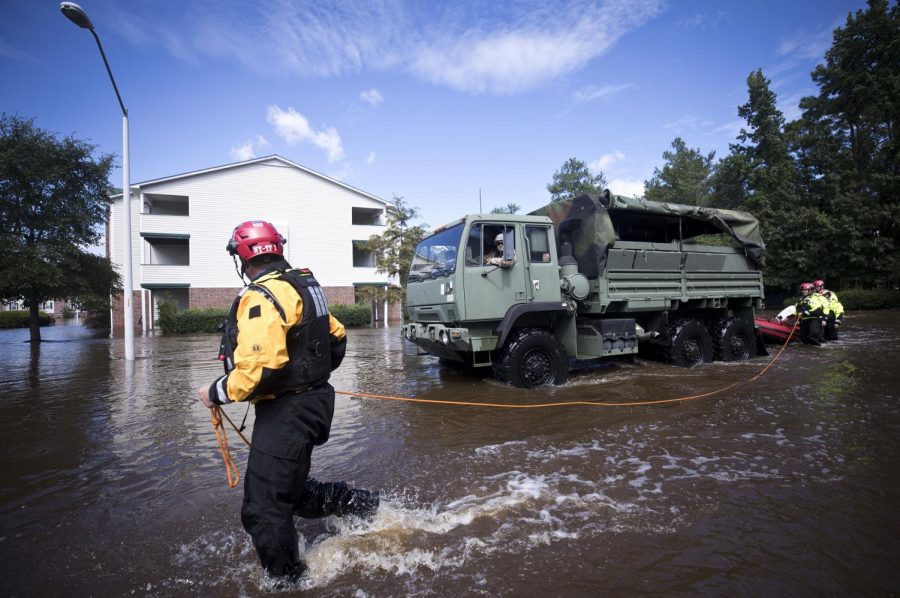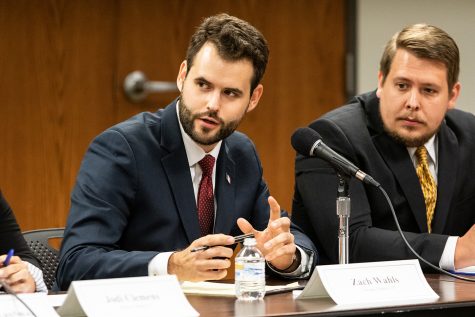Helton: Climate change will create an enormous refugee crisis
Rising oceans and unlivable land is only going to continue being a problem for the next century.
New York Urban Search and Rescue team members, along with members of the N.C. Army National Guard, prepare to evacuate residents at the Heritage at Fort Bragg Apartments in Spring Lake, N.C., Tuesday Sept. 18, 2018. (Julia Wall/Raleigh News & Observer/TNS)
September 18, 2018
Hurricanes are deadly, with devastating winds and unimaginable amounts of water all coming and going in a matter of days. Clean-up after Hurricane Florence is underway, but there’s another nightmare threatening our coasts, and it’s not going to be fixed with the Red Cross and some FEMA funds.
You may have heard of climate refugees, people who are forced to flee their homes because of environmental factors. What you may not know is just how many there are worldwide. That’s because we don’t really know — there’s no international legal definition for who counts as climate refugee.
For this article’s purposes, we’re going to specifically look at those forced to move because of living conditions slowly changed by the environment, not those running out of the way of the next major hurricane. Let’s go to Bangladesh. It is almost exactly the size of our state of Iowa but with more than 50 times the population. (Imagine 160 million people crammed between the Mississippi and Missouri Rivers.) There’s another key factor to Bangladesh that makes it different from the Hawkeye State; it sits on the northern coast of the Indian Ocean. Well, “sits on” isn’t quite right. It’s more like the sea level is a blanket slowly engulfing the low-lying nation.
RELATED: Helton: The new EPA plan could devastate Iowa, but not without a fight
It’s common knowledge in the environmental community that elevating ocean temperatures are inching up coastlines right along with them. Think of how water expands and eventually boils over when heated on a stove, except instead of a little liquid getting much hotter, we have literal oceans getting just a little warmer. That’s going to cause a massive disruption.
What does that mean for Bangladeshis? It’s bad news even by conservative estimates. According to their government environmental-strategy report from 2009, the disrupted water supply has already forced hundreds of thousands to move and that could be 6 million to 8 million by 2050. Those are the estimates from nearly a decade ago, and it’s not exactly as if we’ve started reversing climate change since the recession.
Maybe that doesn’t sound all that consequential, but the number of climate refugees is rising as fast as Bangladesh’s shores. An article in Scientific American estimated that at least 20 percent of the country’s current land mass could be underwater by 2100, threatening 30 million people. This isn’t a simple erosion problem. So, what are we going to do?
Let’s forget future problems for a moment and focus on today’s major refugee crisis. The Syrian Civil War has displaced around 13 million people, according to Pew Research Center. The enormous logistical, economic and political stress of handling Syrians fleeing their battle-torn nation has pushed many people in Europe near the breaking point. And the United States? Our supposed beacon of freedom has been strangely dim in the Syrian tragedy.
RELATED: Iowa Students for Refugees increases awareness on social justice issue
But let’s not be so cynical. Instead, let’s find a solution. Regardless of what you think should be done to resolve massive refugee migration, we can all agree it would be best if no one had to involuntarily leave their home in the first place. If we don’t want to deal with tens of millions more foreigners running to other countries to seek safety, we must take massive action on climate change.
I don’t have the space here to lay out what that would look like, but there’s plenty of literature for what can be done to reduce human impact on the global environment. It’s not a perfect plan nor a complete one, but unless we want to debate how to care for millions of stranded Bangladeshis, I suggest we get to work.



















